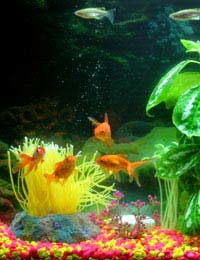Maximum Temperature for a Biorb Tank?

Q.
We have recently bought a heater for our biorb tank ready for when we get tropical fish. What we would like to know is what's the maximum temperature that we need to turn the heater up to, at the moment we are turning it up gradually but when should we stop?
A.
The ideal temperature for your aquarium depends on the kind of fish you want to keep in it, but there are also other factors to consider when dealing with a biorb.
As a rule, the cooler your aquarium is, the easier it is to look after. It's also much easier to look after big aquariums than small ones. This is because things take longer to go wrong in a bigger ecosystem, whilst heat means that most problematic bacteria will metabolise more quickly and breed faster.
Because biorbs are small, it's better to try and keep them relatively cool - around 24°C - choosing fish that are happier at this sort of temperature, such as danios, barbs or the smaller species of tetra. Smaller fish will be happier generally in this type of aquarium as they'll have more space to move and behave naturally.
If you set up a community of different types of fish in your tank, it's important to make sure that they will all be comfortable at the same temperature. It's also important to keep the temperature stable, as changes can have a negative effect on fish health. Again, this is more difficult in a smaller tank, so you should make sure you have a good quality heater and an aquarium thermometer which you check regularly.
Remember that the temperature of your tank can be affected by the overall temperature of your house. Even if your heater has a good thermostat, you should be especially careful about checking the temperature in very warm or cold weather.
It's good that you're taking your time to heat up your tank as this will help you to establish a stable ecosystem. When you reach your chosen temperature, you should run the tank for another week before introducing the fish, to give everything time to stabilise.
A small, warm aquarium is more vulnerable to disease, so you should pay close attention to your fishes' health and have medicines on hand to enable you to deal with problems as soon as they appear. However, if you set things up properly and are careful and attentive, you should have many years of successful fishkeeping to look forward to.
- My Blue Shark Seems to Panic: What Can I Do?
- My Pet Fish is 20 Years Old is this a Record?
- Why do my Fish Keep Dying?
- How do I Care for my Chilid Fish?
- How Can I Get Rid of White Flies in my FishTank?
- Which Fish go Together?
- Why is My Clown Loach Fish Smaller and Less Active than the Others?
- Why Are My Fish Acting Aggressively?
- Can I Use Bottled Water in my Fish Tank?
- Should I Keep My Aquarium Lights On?


Re: Providing Toys for Your Fish
Toys for my baby Flowerhorn fish??? And where to buy them ?
Re: Snail Infestations in Your Fish Tank
My coy fish just started darting and running into the glass. I've checked them over and see nothing on the outside of…
Re: My Pet Fish is 20 Years Old is this a Record?
I purchased a gold fish on April 1997 for my daughters and the same fish is alive and well. The reason I'm…
Re: Dealing with Bullying Between Fish
I have 3 Bolivian butterfly rams not sure the genders,but at the start all 3 were fine but just recently we’ve notice 2…
Re: Using Electrical Devices Safely In Your Aquarium
Monthly water changes isn’t enough I would be changing at least a 1/3 weekly. I do it more often than…
Re: Dealing with Bullying Between Fish
I have a blue gourami that has been living with 4 platty’s and a yoyo loach. I noticed a couple of my fish missing. I…
Re: Lighting for Aquatic Animals
Will a UV submersible light harm my tropical tank and fish. Thanks for any help
Re: Dealing with Bullying Between Fish
Recently put 12 new Africans in my 55 gallon tank. Many rocks and hiding places. After 2,3 days one of them, obliquidens,…
Re: Food Quantities
Just noticed smallest neon tetra tail is missing and white on the edges. Another also has half of tail missing. They was OK a few days ago. I only…
Re: Providing Toys for Your Fish
I have guppies and I think the ideas for toys might be too big, I have tried training them but they aren't responding.